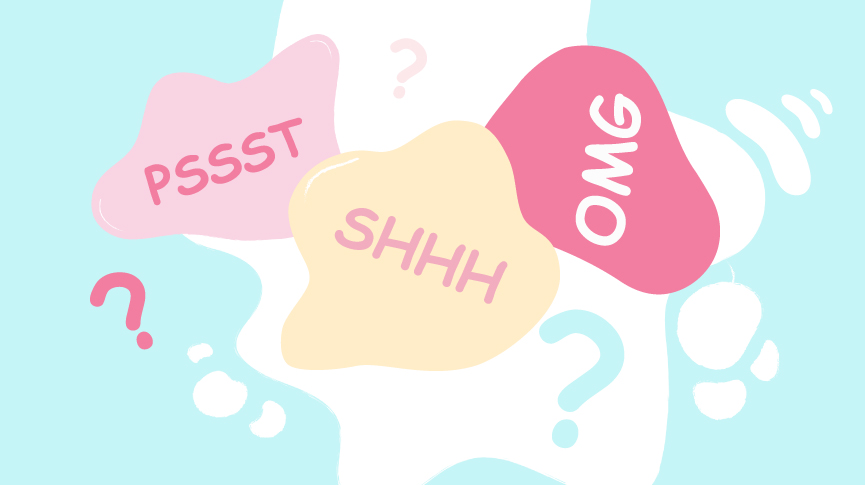These Common, Weird Period Rumors Are Totally False

This article was medically fact-checked by Consultant Obstetrician and Gynaecologist Dr. Shree Datta.
Menstrual cycles are so wonderfully mysterious that they’ve developed a rumor mill all their own! Well, actually, periods aren’t all that weird or confusing, but we know it can seem that way if you don’t have all the facts.
Rumors about menstruation have been around for centuries, and some really crazy ones still exist today. If there are folks in certain parts of the world who think you have to wash your pads before tossing them to prevent attracting ghosts into your home, we can see why some people might believe that tampons can “steal” your virginity.
We’ve myth-busted a handful of these wacky period rumors with the help of our old pal science. Before you make the mistake of going menstrual product-free in the pool or assuming only sexually active folks can use period cups, give these factoids a read (and then pass along these non-rumors to your friends!).
Myth: Your period automatically stops when you’re submerged in water.
Truth: There is a tiny, scientific grain of truth to this myth, but it’s not what you think.
Your period doesn’t out-right stop in water, but the pressure of the water on your body (mostly) holds the blood inside and keeps it from flowing downward through the vagina. Basically, the flow can be stemmed temporarily.
You could potentially experiment with this law of physics while alone in the bathtub, but we wouldn’t recommend it while swimming in a pool, hot tub or any other public place like the beach.
The water pressure that’s keeping your period blood inside the uterus can be easily expelled with a swift kick of your dive fins or while screaming as your pal dunks you underwater.
Pretty much any downward force from your pelvic muscles – which can be set off by just about anything, like a laugh or a sneeze – could send a cloud of blood gushing into the water.
If you’re going for a swim during your period, just trust us and wear your menstrual cup.
Myth: Inserting menstrual protection products into the vagina – like tampons or period cups – means you’re no longer a virgin.
Truth: For starters, let’s squash the totally ancient, patriarchal idea of virginity. Nothing is “taken” from you the moment you have sexual intercourse with another human being. It’s 2020, and it’s time to stop teaching young people – especially girls – that you’re pure and perfect before ever having a penis or any other human body part inside of you, and after that, you’re spoiled and used up.
Of course you’re going to be nervous and excited the first time toy have sex. That’s normal for everyone. If you’ve got a vagina, you might even feel a little bit of pain or discomfort as your hymen and vagina stretch during your first-ever penetration. This doesn’t happen for everyone, as it depends on your individual anatomy, but it’s ok for sex to feel a little weird the first time around.
This is why the most important aspect of first-time sex is choosing a partner who cares about your comfort, makes sure you’re aroused with lots of foreplay, and goes slow while checking in on your feelings.
However, back to the topic at hand! Yes, you can absolutely use tampons or a menstrual cup if you’ve never had sex before. The state of your hymen and vagina don’t affect your ability to insert period products into your body. Just make sure you choose a period cup that’s smaller and made to fit comfortably inside a vaginal canal that hasn’t yet been stretched by penetration or childbirth.
If you’re going with tampons, always choose the smallest size possible that fits your flow that day.
Myth: You can’t get pregnant on your period.
Truth: Oh, yes you can! Don’t believe this high school rumor. Always use protection when having sex, preferably condoms if you have any reason to worry or wonder about catching an STI or sexually transmitted infection.
While it’s not the most likely way to get pregnant, it’s still too possible to take that risk. We did some reading from the research compiled by the trusty experts at Healthline.com. They tell us that every woman’s ovulation cycle is different, meaning it’s hard to tell exactly when it’s absolutely safe to have unprotected sex (so, really, just don’t unless you’re ready to get pregnant).
While it’s not as likely that you’ll get pregnant within the first few days of your period, those chances grow with every passing day, even though you’re still bleeding. It’s even possible to bleed while you’re most fertile and mistake it for the safe zone of your period.
Additionally, sperm can survive inside your body for up to 72 hours, and the end of your period increases the chances of getting pregnant even more.
Once again, we’re going to advise you to just stick with the science and always use protection, period sex or not.
Myth: You can stop your period or end it early by sucking the blood out, taking NSAID anti-inflammatory pills or drinking lemon juice or apple cider vinegar.
Truth: While there has been some research into all-natural period control methods, like drinking lemon juice or apple cider vinegar, none of these methods have been proven to work.
Adding a little lemon juice or apple cider vinegar to a glass of water can be beneficial for your health in other ways, but it’s doubtful that they’ll have any effect on your period. In fact, Healthline.com suggests that apple cider vinegar can even bring your period right on time if you’ve been having issues with hormonal imbalances.
Anti-inflammatories like Ibuprofen do not stop periods; there are medications which can be used to stop period flow, but these are usually given under the care of a Gynaecologist. Medications like Ibuprofen or Naproxen are methods of which we’d suggest steering clear. While it’s certainly okay to occasionally take over-the-counter pain meds for period pain, these medicines can weaken the stomach lining and put undue pressure on your kidneys. We’d recommend an ultrasound scan to make sure women have no other problems before considering this.
While NSAIDs can’t stop or reduce periods, they can help reduce period pains. Never take more NSAID pills than your doctor recommends for pain relief, as these meds can be dangerous when taken in large quantities. We hope you’ll just pop in a period cup during your next period and wait out your natural cycle. Your body will thank you in the end.
Facts checked by:
Dr. Shree Datta
Dr. Shree Datta is a Consultant Obstetrician and Gynaecologist in London, specialising in women’s health including all menstrual problems such as fibroids and endometriosis. Dr. Shree is a keen advocate for patient choice, having written numerous articles and books to promote patient and clinician information. Her vision resonates with INTIMINA, with the common goals of demystifying periods and delivering the best possible care to her patients
Written by:

Colleen Godin is a sexual wellness writer and journalist. She operates a one-woman business at ThePleasureConnection.net, specializing in copywriting, marketing and events for the greater pleasure industry. In her spare time, she enjoys disappearing into the forest, finding herself in a great song, and long drives during spontaneous road trips.




I just tried the ziggy cup and I will never go back to tampons or pads. In one day, I am a true believer. Thank you. It is an amazing product!